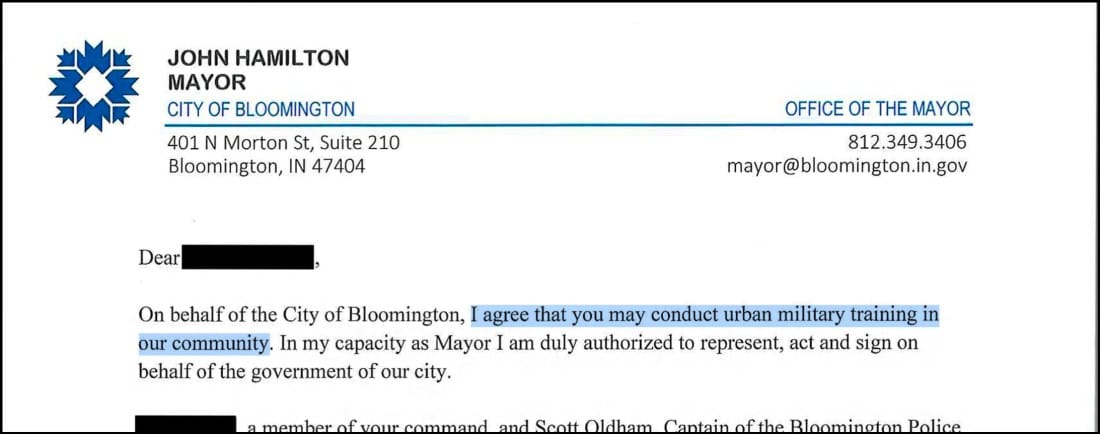Bloomington mayor to US Army: “I agree that you may conduct urban military training in our community.”


On Wednesday, an undated letter from Bloomington mayor John Hamilton to officers in the US military, was released by the city of Bloomington in response to a records request made under Indiana’s Access to Public Records Act (APRA).
The APRA requests were made by The B Square in connection with military training exercises that were conducted inside Bloomington city limits on the night of June 7. [Request 1] [Request 2]
The opening paragraph in the letter from Hamilton begins: “On behalf of the City of Bloomington, I agree that you may conduct urban military training in our community. In my capacity as Mayor I am duly authorized to represent, act and sign on behalf of the government of our city.”
In the final sentence of the letter’s second paragraph, Hamilton appears to indicate he believes he has the authority to decide whether the exercises are allowed to take place. He writes: “I also understand that this is not to be considered blanket permission, and that I may change my mind at any time—without cause.”
A few hours after the training exercise was conducted, The B Square submitted several questions to the mayor’s office, including one about who made a decision to give permission for the June 7 military exercises to be conducted in the city.
The mayor’s office answered on June 8 without identifying anyone who made a decision to give permission: “The City cannot prohibit the federal government from conducting a training exercise.”
In its written response to that question, the mayor’s office did not mention that the mayor gave the kind of permission that was revealed in the letter released on Wednesday.
The start of the exercises prompted immediate outcry on social media outlets from residents, who had mostly received no advance notification about the exercise, and had their sleep disrupted with the sound of tree-top level helicopters and simulated gunfire in the middle of the night.
In contrast to answers from the mayor’s office on June 8, the mayor’s letter, released on Wednesday, squares up with statements made by the deputy public affairs officer with the U.S. Army Special Operations Command: “[The US Army] really couldn’t do this type of training without the support of local leaders in law enforcement. We certainly wouldn’t go into a building to which we weren’t invited. That would be trespassing.”
Although the letter from the mayor released on Wednesday is undated, Bloomington’s communication’s director Yael Ksander wrote to the B Square that the date on the mayor’s letter was inadvertently omitted, but was sent on April 14. That’s consistent with information from the US Army office of public affairs, which told the B Square that efforts to coordinate with the city of Bloomington started in April.
In response to an earlier B Square question asked on June 8—about when the city received a notification or a request from the US Army to conduct training—the mayor’s office did not give a responsive answer .
The answer stated: “This was not a City training exercise, and the City cannot accurately characterize the required permissions. We recommend that you redirect this question to the agency that conducted last night’s training.” The response from the mayor’s office looks like it might have been copy-pasted from a different answer.
In response to The B Square’s APRA request, no written communication from the military—to which the mayor’s letter might have been a reply—was produced by the city.
The mayor’s letter is the only document that the city produced in response to The B Square’s request.
The city’s response to the B Square denies some of the request by saying it’s not specific enough (emphasis added): “[T]his request is denied because it does not meet the ‘reasonable particularity’ standard of I.C. 5-14-3-3(a)(1) in that it does not identify, nor limit the number of, persons with whom Mayor Hamilton or Chief [Mike] Diekhoff are to have exchanged communications.”
The APRA’s “reasonable particularity” requirement is a frequent point of friction between journalists and government lawyers.
Could The B Square have narrowed its request, by identifying representatives of the military with whom Hamilton and Diekhoff might have exchanged email messages?
Mayor Hamilton’s letter included two names of military personnel that might be used to narrow such a request. But the city’s response states: “The names of military personnel have been redacted for security purposes at the request of the Army.”
The B Square has followed up with a new APRA request to the city of Bloomington, narrowed by descriptive reference to individuals, but not by name.
The new request asks for communications involving “the individuals whose names were redacted in a document provided by the city of Bloomington on June 16, 2021 in response to The B Square’s previous APRA request of June 8.”




Comments ()